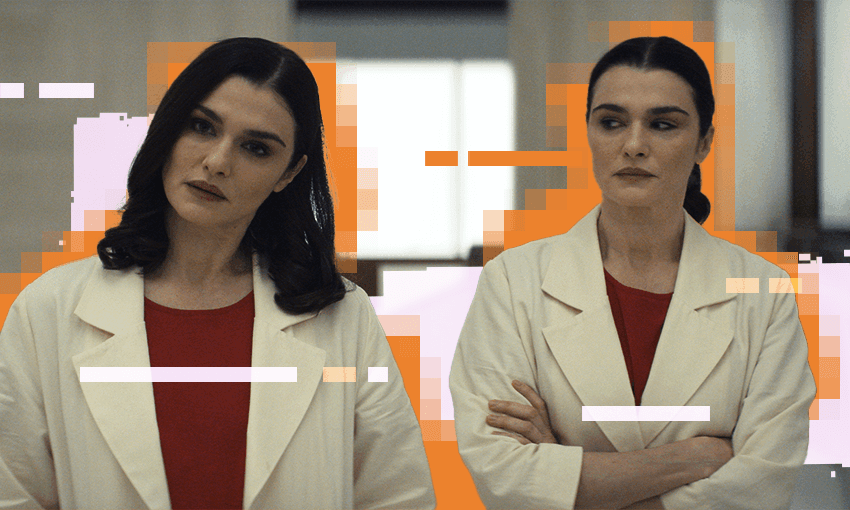Why you need to see Prime Video’s remake of David Cronenberg’s 1988 horror film, led by a doubly good performance by Rachel Weisz.
This is an excerpt from The Spinoff’s Friday TV newsletter Rec Room. Sign up here.
Rachel Weisz is smashing felafel into her face. She’s barely finishing one bite of her pita pocket before ripping into the next. Yoghurt dressing is smeared across her cheeks. When she talks, chunks fly in all directions. “You … ah … having a good day?” asks the owner of a nearby food truck, cautiously watching her inhale food like she hasn’t eaten in a week. “No, I’m having a fucking shit day,” replies Weisz, felafel stuck to her bottom lip and chewed pita hanging out the corner of her mouth.
It’s here that things take a turn. Weisz – playing one of two gynaecologist twins and absolutely monstering every scene she’s in – has just witnessed the death of a mother. Because of a missed post-birth scan, a father has been left literally holding the baby. It could have been avoided, and Weisz’s Dr Elliott Mantle needs an outlet, so the felafel guy gets it in the neck. “Fuck you for asking about my day,” she snarls. “Seriously” – she pauses here to tear off another bite of her pita – “Fuck you!”
If you can’t already tell from this scene, Weisz is absolutely letting rip. There’s something primal, almost feral, about her dual performances in Dead Ringers, Prime Video’s incredible gender-flipping reboot of David Cronenberg’s 1988 psychological horror. As Beverly, she’s more conservative, the doctor who cares, the one who wants to give every mother, and every baby, the chance to live a long, happy life.
Elliot is her coke-sniffing twin, the one chasing A-list movie stars, asking a husband to get “it” out while his pregnant wife’s in the toilet, breaking all the rules to grow a test tube baby. I don’t want to say any more, because to do so would be to spoil Dead Ringer’s more sadistic delights, but if you’re picturing a TV show entirely dedicated to gynaecologist versions of Phoebe Waller-Bridge’s snarling Fleabag and her stuck-up sister Claire, you’re nearly there.
The result is television’s most frenetic, full-on, full frontal show. The first episode of six is soaked in blood, has multiple graphic sex scenes, rivals Succession for use of the f-word, and at one point made me flee the room. It also continues Hollywood’s controversial trend of graphic birth sequences (see: House of the Dragon, The Last of Us, Yellowjackets and Fleishman is in Trouble) with a montage so confronting I was forced to put down my snacks and peer between my fingers. Don’t eat your dinner over this one. You’ll discard it within the first five minutes.
Rebooting and gender-flipping Cronenberg’s cult classic seems like such an unlikely move. How did Weisz pull this off? According to this interview with the BBC, making all those conversations with her twin work wasn’t easy. Weisz played one side, ran into hair and make-up, then did the other. Someone talked to her through an earpiece. Weisz calls it “the most challenging and most joyful experience in my career”.
But there’s reason behind all that shocking stuff. Weisz and the show’s creators wanted to use Dead Ringers to make a point. “We’re incredibly used to seeing violence and people being killed, death, blood… we’re almost immune to that at this point,” she told the BBC. “For me, I think it’s a beautiful moment, it’s kind of a miracle when a baby’s born. We didn’t want to be coy about it.” That moment when she’s smashing felafel into her face? It’s because the woman who died was a woman of colour. “The high mortality rate for women of colour… we talked about that probably every day.”
If you can cope with a show basically set in The Handmaid’s Tale’s birthing centre, there is a show here that crackles with electricity. It’s got the vibe of a classic 90s David Fincher film. It’s got dialogue like, “Why are you wearing my vagina like it’s a fucking glove?” Episode one ends with a blood-curdling scream from Weisz, then Celine Dion cooing the lyrics to ‘Think Twice’ (“This is getting serious…”) Underpinning it all are two absolutely sensational, career-best performances by Weisz.
I get it if Dead Ringers may not be for you. It’s definitely not for everyone. But it is 100% for me. Right now, I don’t want to watch anything else.
Dead Ringers is available to stream on Prime Video.



